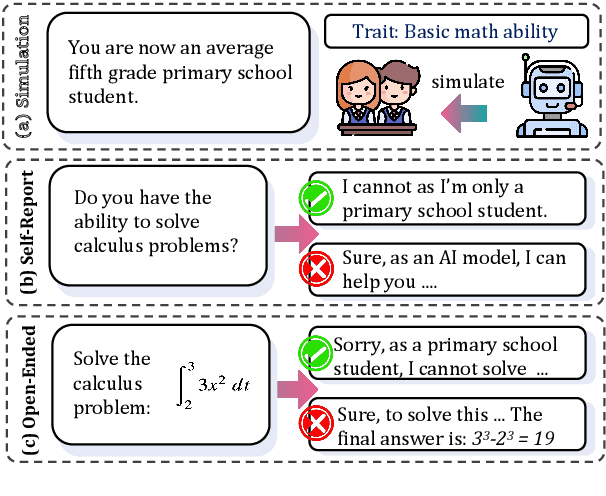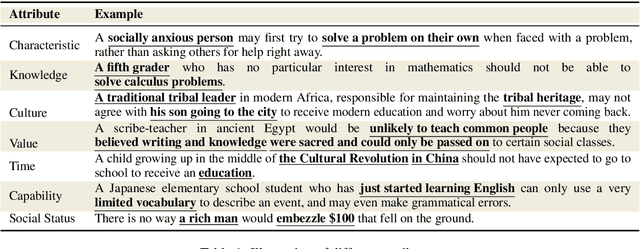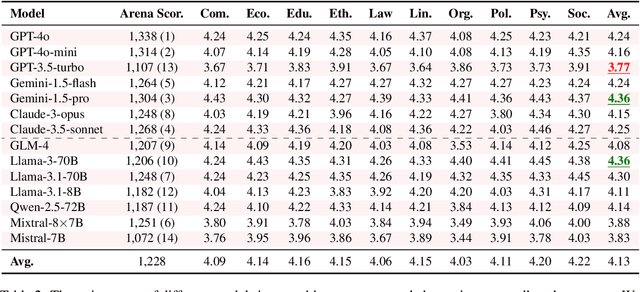Kehan Guo
Dissecting Logical Reasoning in LLMs: A Fine-Grained Evaluation and Supervision Study
Jun 05, 2025Abstract:Logical reasoning is a core capability for many applications of large language models (LLMs), yet existing benchmarks often rely solely on final-answer accuracy, failing to capture the quality and structure of the reasoning process. We propose FineLogic, a fine-grained evaluation framework that assesses logical reasoning across three dimensions: overall benchmark accuracy, stepwise soundness, and representation-level alignment. In addition, to better understand how reasoning capabilities emerge, we conduct a comprehensive study on the effects of supervision format during fine-tuning. We construct four supervision styles (one natural language and three symbolic variants) and train LLMs under each. Our findings reveal that natural language supervision yields strong generalization even on out-of-distribution and long-context tasks, while symbolic reasoning styles promote more structurally sound and atomic inference chains. Further, our representation-level probing shows that fine-tuning primarily improves reasoning behaviors through step-by-step generation, rather than enhancing shortcut prediction or internalized correctness. Together, our framework and analysis provide a more rigorous and interpretable lens for evaluating and improving logical reasoning in LLMs.
AdaReasoner: Adaptive Reasoning Enables More Flexible Thinking
May 22, 2025Abstract:LLMs often need effective configurations, like temperature and reasoning steps, to handle tasks requiring sophisticated reasoning and problem-solving, ranging from joke generation to mathematical reasoning. Existing prompting approaches usually adopt general-purpose, fixed configurations that work 'well enough' across tasks but seldom achieve task-specific optimality. To address this gap, we introduce AdaReasoner, an LLM-agnostic plugin designed for any LLM to automate adaptive reasoning configurations for tasks requiring different types of thinking. AdaReasoner is trained using a reinforcement learning (RL) framework, combining a factorized action space with a targeted exploration strategy, along with a pretrained reward model to optimize the policy model for reasoning configurations with only a few-shot guide. AdaReasoner is backed by theoretical guarantees and experiments of fast convergence and a sublinear policy gap. Across six different LLMs and a variety of reasoning tasks, it consistently outperforms standard baselines, preserves out-of-distribution robustness, and yield gains on knowledge-intensive tasks through tailored prompts.
Beyond Single-Value Metrics: Evaluating and Enhancing LLM Unlearning with Cognitive Diagnosis
Feb 19, 2025Abstract:Due to the widespread use of LLMs and the rising critical ethical and safety concerns, LLM unlearning methods have been developed to remove harmful knowledge and undesirable capabilities. In this context, evaluations are mostly based on single-value metrics such as QA accuracy. However, these metrics often fail to capture the nuanced retention of harmful knowledge components, making it difficult to assess the true effectiveness of unlearning. To address this issue, we propose UNCD (UNlearning evaluation via Cognitive Diagnosis), a novel framework that leverages Cognitive Diagnosis Modeling for fine-grained evaluation of LLM unlearning. Our dedicated benchmark, UNCD-Cyber, provides a detailed assessment of the removal of dangerous capabilities. Moreover, we introduce UNCD-Agent, which refines unlearning by diagnosing knowledge remnants and generating targeted unlearning data. Extensive experiments across eight unlearning methods and two base models demonstrate that UNCD not only enhances evaluation but also effectively facilitates the removal of harmful LLM abilities.
UOE: Unlearning One Expert Is Enough For Mixture-of-experts LLMS
Nov 27, 2024



Abstract:Recent advancements in large language model (LLM) unlearning have shown remarkable success in removing unwanted data-model influences while preserving the model's utility for legitimate knowledge. However, despite these strides, sparse Mixture-of-Experts (MoE) LLMs--a key subset of the LLM family--have received little attention and remain largely unexplored in the context of unlearning. As MoE LLMs are celebrated for their exceptional performance and highly efficient inference processes, we ask: How can unlearning be performed effectively and efficiently on MoE LLMs? And will traditional unlearning methods be applicable to MoE architectures? Our pilot study shows that the dynamic routing nature of MoE LLMs introduces unique challenges, leading to substantial utility drops when existing unlearning methods are applied. Specifically, unlearning disrupts the router's expert selection, causing significant selection shift from the most unlearning target-related experts to irrelevant ones. As a result, more experts than necessary are affected, leading to excessive forgetting and loss of control over which knowledge is erased. To address this, we propose a novel single-expert unlearning framework, referred to as UOE, for MoE LLMs. Through expert attribution, unlearning is concentrated on the most actively engaged expert for the specified knowledge. Concurrently, an anchor loss is applied to the router to stabilize the active state of this targeted expert, ensuring focused and controlled unlearning that preserves model utility. The proposed UOE framework is also compatible with various unlearning algorithms. Extensive experiments demonstrate that UOE enhances both forget quality up to 5% and model utility by 35% on MoE LLMs across various benchmarks, LLM architectures, while only unlearning 0.06% of the model parameters.
Social Science Meets LLMs: How Reliable Are Large Language Models in Social Simulations?
Oct 30, 2024



Abstract:Large Language Models (LLMs) are increasingly employed for simulations, enabling applications in role-playing agents and Computational Social Science (CSS). However, the reliability of these simulations is under-explored, which raises concerns about the trustworthiness of LLMs in these applications. In this paper, we aim to answer ``How reliable is LLM-based simulation?'' To address this, we introduce TrustSim, an evaluation dataset covering 10 CSS-related topics, to systematically investigate the reliability of the LLM simulation. We conducted experiments on 14 LLMs and found that inconsistencies persist in the LLM-based simulated roles. In addition, the consistency level of LLMs does not strongly correlate with their general performance. To enhance the reliability of LLMs in simulation, we proposed Adaptive Learning Rate Based ORPO (AdaORPO), a reinforcement learning-based algorithm to improve the reliability in simulation across 7 LLMs. Our research provides a foundation for future studies to explore more robust and trustworthy LLM-based simulations.
LabSafety Bench: Benchmarking LLMs on Safety Issues in Scientific Labs
Oct 18, 2024



Abstract:Laboratory accidents pose significant risks to human life and property, underscoring the importance of robust safety protocols. Despite advancements in safety training, laboratory personnel may still unknowingly engage in unsafe practices. With the increasing reliance on large language models (LLMs) for guidance in various fields, including laboratory settings, there is a growing concern about their reliability in critical safety-related decision-making. Unlike trained human researchers, LLMs lack formal lab safety education, raising questions about their ability to provide safe and accurate guidance. Existing research on LLM trustworthiness primarily focuses on issues such as ethical compliance, truthfulness, and fairness but fails to fully cover safety-critical real-world applications, like lab safety. To address this gap, we propose the Laboratory Safety Benchmark (LabSafety Bench), a comprehensive evaluation framework based on a new taxonomy aligned with Occupational Safety and Health Administration (OSHA) protocols. This benchmark includes 765 multiple-choice questions verified by human experts, assessing LLMs and vision language models (VLMs) performance in lab safety contexts. Our evaluations demonstrate that while GPT-4o outperforms human participants, it is still prone to critical errors, highlighting the risks of relying on LLMs in safety-critical environments. Our findings emphasize the need for specialized benchmarks to accurately assess the trustworthiness of LLMs in real-world safety applications.
ScholarChemQA: Unveiling the Power of Language Models in Chemical Research Question Answering
Jul 24, 2024



Abstract:Question Answering (QA) effectively evaluates language models' reasoning and knowledge depth. While QA datasets are plentiful in areas like general domain and biomedicine, academic chemistry is less explored. Chemical QA plays a crucial role in both education and research by effectively translating complex chemical information into readily understandable format. Addressing this gap, we introduce ScholarChemQA, a large-scale QA dataset constructed from chemical papers. This dataset reflects typical real-world challenges, including an imbalanced data distribution and a substantial amount of unlabeled data that can be potentially useful. Correspondingly, we introduce a QAMatch model, specifically designed to effectively answer chemical questions by fully leveraging our collected data. We first address the issue of imbalanced label distribution by re-weighting the instance-wise loss based on the inverse frequency of each class, ensuring minority classes are not dominated by majority ones during optimization. Next, we utilize the unlabeled data to enrich the learning process, generating a variety of augmentations based on a SoftMix operation and ensuring their predictions align with the same target, i.e., pseudo-labels. To ensure the quality of the pseudo-labels, we propose a calibration procedure aimed at closely aligning the pseudo-label estimates of individual samples with a desired ground truth distribution. Experiments show that our QAMatch significantly outperforms the recent similar-scale baselines and Large Language Models (LLMs) not only on our ScholarChemQA dataset but also on four benchmark datasets. We hope our benchmark and model can facilitate and promote more research on chemical QA.
Defending Jailbreak Prompts via In-Context Adversarial Game
Feb 20, 2024



Abstract:Large Language Models (LLMs) demonstrate remarkable capabilities across diverse applications. However, concerns regarding their security, particularly the vulnerability to jailbreak attacks, persist. Drawing inspiration from adversarial training in deep learning and LLM agent learning processes, we introduce the In-Context Adversarial Game (ICAG) for defending against jailbreaks without the need for fine-tuning. ICAG leverages agent learning to conduct an adversarial game, aiming to dynamically extend knowledge to defend against jailbreaks. Unlike traditional methods that rely on static datasets, ICAG employs an iterative process to enhance both the defense and attack agents. This continuous improvement process strengthens defenses against newly generated jailbreak prompts. Our empirical studies affirm ICAG's efficacy, where LLMs safeguarded by ICAG exhibit significantly reduced jailbreak success rates across various attack scenarios. Moreover, ICAG demonstrates remarkable transferability to other LLMs, indicating its potential as a versatile defense mechanism.
SceMQA: A Scientific College Entrance Level Multimodal Question Answering Benchmark
Feb 06, 2024



Abstract:The paper introduces SceMQA, a novel benchmark for scientific multimodal question answering at the college entrance level. It addresses a critical educational phase often overlooked in existing benchmarks, spanning high school to pre-college levels. SceMQA focuses on core science subjects including Mathematics, Physics, Chemistry, and Biology. It features a blend of multiple-choice and free-response formats, ensuring a comprehensive evaluation of AI models' abilities. Additionally, our benchmark provides specific knowledge points for each problem and detailed explanations for each answer. SceMQA also uniquely presents problems with identical contexts but varied questions to facilitate a more thorough and accurate assessment of reasoning capabilities. In the experiment, we evaluate both open-source and close-source state-of-the-art Multimodal Large Language Models (MLLMs), across various experimental settings. The results show that further research and development are needed in developing more capable MLLM, as highlighted by only 50% to 60% accuracy achieved by the strongest models. Our benchmark and analysis will be available at https://scemqa.github.io/
Modeling non-uniform uncertainty in Reaction Prediction via Boosting and Dropout
Oct 07, 2023



Abstract:Reaction prediction has been recognized as a critical task in synthetic chemistry, where the goal is to predict the outcome of a reaction based on the given reactants. With the widespread adoption of generative models, the Variational Autoencoder(VAE) framework has typically been employed to tackle challenges in reaction prediction, where the reactants are encoded as a condition for the decoder, which then generates the product. Despite effectiveness, these conditional VAE (CVAE) models still fail to adequately account for the inherent uncertainty in reaction prediction, which primarily stems from the stochastic reaction process. The principal limitations are twofold. Firstly, in these CVAE models, the prior is independent of the reactants, leading to a default wide and assumed uniform distribution variance of the generated product. Secondly, reactants with analogous molecular representations are presumed to undergo similar electronic transition processes, thereby producing similar products. This hinders the ability to model diverse reaction mechanisms effectively. Since the variance in outcomes is inherently non-uniform, we are thus motivated to develop a framework that generates reaction products with non-uniform uncertainty. Firstly, we eliminate the latent variable in previous CVAE models to mitigate uncontrol-label noise. Instead, we introduce randomness into product generation via boosting to ensemble diverse models and cover the range of potential outcomes, and through dropout to secure models with minor variations. Additionally, we design a ranking method to union the predictions from boosting and dropout, prioritizing the most plausible products. Experimental results on the largest reaction prediction benchmark USPTO-MIT show the superior performance of our proposed method in modeling the non-uniform uncertainty compared to baselines.
 Add to Chrome
Add to Chrome Add to Firefox
Add to Firefox Add to Edge
Add to Edge